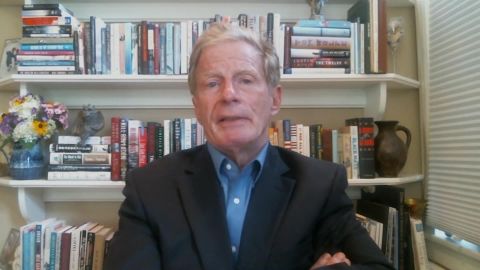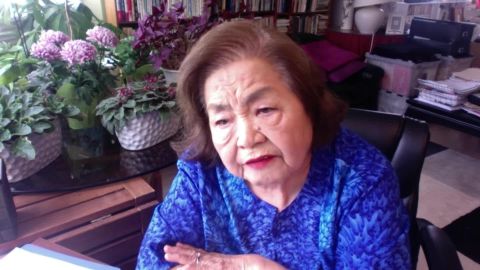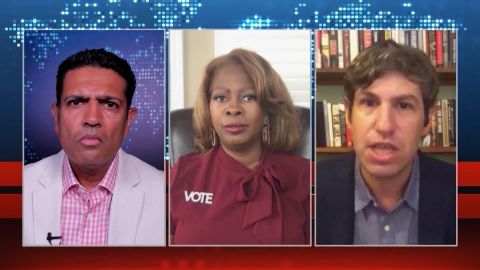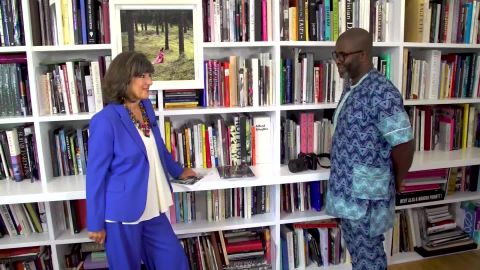Read Transcript EXPAND
CHRISTIANE AMANPOUR: And now let’s dig further into what’s emerging as the president’s favorite boogeyman. That is mail-in ballots, as we just said, and what’s at stake for voters when a president and his party drum up fears about the election’s integrity. Ari Berman is an author and senior reporter at the progressive magazine “Mother Jones.” And LaTosha Brown is a community organizer, political strategist, and co-founder of the Black Voters Matter Fund. Here is our Hari Sreenivasan and talking to them about what voters must watch out for now.
HARI SREENIVASAN: Christiane, thanks so much. LaTosha Brown, Ari Berman, thank you both for joining us. First, I want to start with kind of your concerns and the big picture. Here we are, still technically in the middle of a pandemic, a fairly consequential election. What are you most concerned about?
ARI BERMAN, AUTHOR, “GIVE US THE BALLOT: THE MODERN STRUGGLE FOR VOTING RIGHTS IN AMERICA”: I’m kind of concerned about two factors that are converging right now, which is that the Republican Party for the past decade has been embarking on a campaign to make it more difficult to vote through things like strict voter I.D. laws, and cutting back on early voting, and closing polling places, and purging voters from the rolls. And that voter suppression campaign has been accelerated because of COVID, because so many Americans are having difficulties voting now. A lot of Americans are not familiar with voting by mail. There were big difficulties in the primary voting by mail. At the same time, in-person voting hasn’t been easy either in many states, because polling places have been closed. There’s been very long lines at the polls. So, I’m worried that the effort to make it harder to vote is going to be dramatically increased because of this pandemic. And a lot of voters are going to have to vote in new and different ways in November, and many could struggle doing so.
SREENIVASAN: LaTosha, you voted in Georgia. What did you learn throughout that day?
LATOSHA BROWN, CO-FOUNDER, BLACK VOTES MATTER: Oh, it was a disaster. I waited in line for three hours. I later went and assisted other voters that had been waiting in line for over six hours. And then, later that evening, there were people who had not voted until 12:37 a.m. the next morning on Wednesday morning. So, it was just atrocious. It was egregious, what we saw happen. And so what I saw this last week election cycle in Georgia and both — in Kentucky — that there was a lack of preparedness. And there seemed to be an attempt of some to take advantage that we’re in this COVID-19 era right now, and really take advantage of that opportunity to not really be able to make sure that people have free and fair access to the ballot. I vote in Louisville, which is in Jefferson County, which is a county with the majority of African-American voters live in that one county; 612,000 voters for one polling site. And so we’re seeing that. We’re seeing that, in the midst of this COVID-19, that there are leaders who do not have the — I don’t think they have the best interests of democracy in mind that are actually closing polling sites and reorganizing plans that are now not covered under pre-clearance in the Voting Rights Act, because it’s been gutted.
SREENIVASAN: Ari, I can hear in the back of my head here state leaders, local leaders saying, look, I have got a pandemic. I’m actually just trying to keep people safe. This is the balance that I’m trying to strike on how many places that I have to close, because I don’t think the volunteers that are usually my poll workers. So — well, how much of this is intentional voter suppression vs. unintentional?
BERMAN: There’s no doubt that election officials are struggling right now to run smooth elections and that they’re struggling to recruit poll workers, and they’re struggling to get the equipment they need to handle an unprecedented flow of mail ballots, and they’re not getting money from Congress or support from the White House. But it doesn’t really matter, at the end of the day, whether it’s intentional or unintentional voter suppression. They were 80 fewer polling places in metro Atlanta during the primaries, and that’s one of the things that led to the six-hour lines that LaTosha was talking about. Was that intentional voter suppression? Was it unintentional voter suppression? Either way, people were being forced to wait six hours to vote. But there have been some trends here that really make you wonder. There are statistics that show that, for example, younger voters, communities of color are more likely to have mail ballots thrown out. There are studies that show that blacks and Hispanics wait almost twice as long as whites to vote, things like that. So, if someone is looking for an excuse to make it harder to vote, COVID gives them the perfect opportunity. And they could say, oh, it wasn’t my intention of voter suppression. It was just the pandemic. Well, at the end of the day, if people are removed from the voting rolls, or they have to wait six hours to vote, or their mail ballots are thrown out, it doesn’t really matter what the intention of the officials were. It matters what the effect was on the voter.
SREENIVASAN: LaTosha, this seems a pattern that people have documented, even pre-pandemic. There was a recent report from the Leadership Conference on Civil and Human Rights, and they found, between 2012 and 2018, that there were 1,688 fewer polling places. So, I mean, this is a pattern that we see throughout different parts of the country, especially in the South and the West. What do we know that happens when there are fewer places to go vote?
BROWN: I want to note that this is a direct result from the 2013, when we look at the Shelby v. Holder case, in which the Supreme Court gutted the Voting Rights Act. Like, there’s an act right now that Congress has to restore the act that has been recently renamed the John Lewis Voting Restoration Act. I’m raising that because those of us that were activists, those of us who actually went to the Supreme Court said exactly — this was very predictable — we said this would happen. And so there’s been an ongoing attack on closing polling sites, making it much — difficult to have free and fair access to the ballot, particularly for communities of color and working-class and poor communities. As a result, what we know, that there are researchers like Carol Anderson that wrote a book called “One Person, No Vote,” that she talks about that, when the polling site is moved just 10 miles, there is a significant drop- off in participation. Part of when we look at rural communities, when we look at transportation, transportation in many areas is a privilege point, that depending on where you live, particularly in the South, where you don’t have a comprehensive transportation system, in the midst of COVID-19, where we have seniors and others that are not as mobile as before, I would think that you would want to keep — you would want to have as many polling sites that are open, that you would find out the intention wouldn’t be to not allow folks to vote, but it would — also to expand the access, so that you could have people more dispersed, that you can actually create a safer environment.
SREENIVASAN: At the same time, registrations are down, thanks in some part to the pandemic. I mean, this is usually prime registration season, if you will. You want to try to make sure that every new voter is registered. DMV — a lot of DMV offices are closed or on limited hours through the pandemic, especially the states that make it automatic that you are registered to vote when you get your first license, or you’re 18, 19 years old, you have got the license in hand. So what are the consequences there of that effect that the pandemic is having on registrations?
BERMAN: What the pandemic is doing to voter registrations is extremely disturbing. The electorate is basically frozen now. We would normally see millions of new people registering to vote in a presidential election year, and they’re not getting registered, because they’re not going to the DMV. There is no or very few in-person registration drives. A lot of people froze their activity during the spring, and they said, we’re going to resurface in the summer. Well, unfortunately, the summer is when COVID has been rising in places like Texas and Florida. So there’s not an ability to register people in traditional ways. And I’m very concerned that millions of young people, millions of people of color are not going to be able to register this time. But it is important to note, Hari, that 40 states have online registration. So, I would urge people who want to register to vote, if your state allows online registration — and it probably does — register to vote online, because that is still the best way and the safest way to register to vote in a pandemic.
SREENIVASAN: LaTosha, this is the season where activists, organizations, community organizations would be out knocking on doors. And I’m assuming that it’s a little harder to knock on doors. It’s probably not impossible. But that’s just not happening nearly at the scale that it was. So, what do you do to stay connected with people to try to make sure that you have that relationship built, that you can make sure that you can get their vote to count?
BROWN: You know, I think it is extremely difficult circumstances in which we’re working in. Those of us know that — how critical this election is, and so we have to find creative ways to do the work. A lot of organizations are now expanding their digital footprint and doing a lot of digital organizing online. We have had to use technology in ways that we have not had to use before in terms of from virtual town hall meetings, to actually pushing people to registration online, to actually go and training some people around absentee ballot — voting absentee and mail-in voting. When you think about voting in the South, I often talk about how my grandmother, when I used to go vote with my grandmother, my grandmother would dress up. Voting for older people in the South, black people, was a big deal. She would dress up and put her pocketbook on her hand, and we would go to vote. And while I didn’t know exactly what we were doing, I knew it was a big deal. I knew it was something special. It was like, you put on your Sunday dress and you go vote. And so there’s a culture of people actually going to the polls to vote. And so now that’s been disrupted. And so, in addition to that, we have to rely on local organizations and churches and the infrastructure in communities to really be a message, to really be the message bearer, and to help organize and make sure that people are voting early, that folks know what to do, and they know about the changes, and they can check themselves, because I think that part of what we’re seeing is, we see there’s a spectrum of voter suppression. We have seen the shaving off of voters of people who say they have been dropped from the voting rolls and not know, not know that they were dropped from voting rolls, including some who had recently voted in an election a year ago. We also know that — and the Brennan Center, according to their report from 2016 to 2018, over 17 million voters were dropped from the voting rolls. And so there is a spectrum of voter suppression that shaves off 1,000 votes here, 1,000 votes there, 1,000 votes here. It’s like death of 1,000 cuts.
SREENIVASAN: I can hear the Heritage Foundation and everyone else saying, here’s this conversation about voting and suppression, but, ultimately, look, should we not have some way to verify that you are a citizen of community X, so that your voice can be heard, that it’s just that it’s legitimate, that you live in that area, that you care about those issues, and that’s why you’re voting? It is — isn’t that a noble goal?
BERMAN: But we already have those safeguards in place. So it’s not like we’re not checking if people are American citizens or whether or not they’re registered to vote. There’s a process in place both for in-person and for mail voting to make sure that you are who you say you are. And voter fraud in this country in general is extremely rare. To just give you an example, the Heritage Foundation, which you just cited, has a whole database of election fraud. They only found 143 criminal convictions for mail ballot fraud over the last 20 years. So that equals out 0.0006 percent of total ballots cast. So, the thing I’m worried about is not voter fraud. The thing that I am worried about in this election in particular is disenfranchisement, the fact that people may have to wait in five- to six-hour lines, if they vote in-person, they might get discouraged and leave, or the fact that they might not — if they vote for mail, they might — if they vote by mail, they might not get their ballots in time. It might not be received in time. It might be thrown out for little things like forgetting to sign your ballot or a mismatched signature. We’re talking about the fact that up to a million people or more could be disenfranchised in this election because of the combination of voter suppression and COVID. That’s way, way, way, way, way more cases than voter fraud. We’re talking about a handful of cases of potential voter fraud, and we’re talking about potentially millions of people being disenfranchised. So I’m concerned not about fraud. I’m concerned about disenfranchisement. That is the number one threat to the U.S. election system right now.
SREENIVASAN: So, let’s talk a little bit about mail-in ballots. We had an expert from MIT from the Election Lab there on the program just a little while ago. And he said, look, the cases of mail-in ballot fraud that the president is talking about are just not supported by the facts. LaTosha, when you go out and talk to people and encourage them to vote, are you telling them to go in-person? Are you telling to use a ballot online — or, I should say, a mail-in ballot?
BROWN: So, what I will say is, just to briefly respond to President Trump, the truth of the matter is, he mails in his ballot. And it’s interesting. If he had a concern with the mail-in ballots, then why should — then he should make sure that they fully fund the Postal Service. In addition to that, he should put someone on the Postal Service that can run an efficient and effective program, instead of a donor to put as postmaster. So, on some level, I can’t take him seriously, because he certainly — certainly is not really concerned about the efficiency or the effectiveness of mail-in ballots. What I will say in terms of when we’re talking to voters, we’re actually — we believe that it’s a false choice to make people feel like they have got to choose either their health and safety or to be able to vote. Like, we believe that — so, what we do is, we actually give people the options and the information of what is available. We encourage people to vote early, that there are ways that you can actually track your vote. We make sure that people are — have the information on registration early. We make sure that people — even in this last election, where we had in Georgia, where we — my nephew applied for an absentee ballot. He didn’t receive it. And so what we — we asked him apply early, applied early, so that, if he didn’t get it in time enough, we had other options. So I think the issue right now is actually encouraging people to find out now that, literally, we have to really understand how serious this is. I’m not being an alarmist, but democracy is really fundamentally under attack. And so in order for us to protect that, that we have to show up and vote in record numbers.
SREENIVASAN: Ari, are states making it harder for people to vote by mail?
BERMAN: Yes. The important thing to remember, Hari, is that a lot of states are ready make it difficult to vote by mail. So, in a lot of states, for example, your ballot has to be received by Election Day, not postmarked by Election Day. So, voters can send back their ballot. They think they’re sending it back with plenty of time, but because of post office delays, their ballot might not be received and they might be disenfranchised through no fault of their own. There are laws, for example, that throw out ballots because of things like mismatched signatures, if you don’t sign your ballot clearly. There are states that have witness requirements for voting. So, in Alabama, for example, you need to have both a copy of your voter I.D. and two witnessers — two witnesses see you sign your ballot or get a notarized affidavit, which is just a crazy requirement in an era of COVID. In Texas, it’s basically impossible if you’re under 65 to vote by mail. In Texas, you can only vote by mail if you’re under 65 if you’re in jail or prison, if you’re out of the county, or if you have a physical disability. And what Texas Republicans are saying is that fear of contracting COVID is not a physical disability. So, they have created situation in Texas where, if you’re over 65, which is a whiter and more Republican demographic, you can vote by mail for any reason. But if you’re under 65, which is a more Democratic-leaning demographic, a younger demographic, a more diverse demographic, you basically can’t vote by mail. That’s the kind of stuff that really concerns me. And I feel like it’s not getting enough attention. All the barriers to mail voting that people face, that’s the real threat, to me, to election integrity in this cycle.
SREENIVASAN: LaTosha, when you go out and talk to people — I mean, Ari just rattled off a list of challenges to mail-in voting that people might get tripped up by. Are states making any effort to make sure that people have kind of a level of voter education, where this is reaching every community?
BROWN: I don’t see the kind of education, particularly in the South, in the Southern states that we’re working in, I do not see the kind of education or the kind of information that is available. There’s a lot of confusion. Just recently, the Supreme Court made a ruling about Alabama, that Alabama state fought for there to be an expansion of doing drop-in mail-in ballots. So the states, and particularly the secretary of state, particularly in deep red states, are — actually have not been very responsive. In many ways, they have been more aggressive at not — at creating these systems that are not welcoming and are not inclusive. And so I think that that’s why we have to really stay on this issue around voter suppression and hold those accountable that literally are responsible for running these elections in our states.
SREENIVASAN: Ari Berman, LaTosha Brown, thank you both for joining us.
BROWN: Thank you.
BERMAN: Thanks so much.
About This Episode EXPAND
Christiane speaks with Hiroshima survivor Setsuko Thurlow about her campaign to abolish nuclear weapons. She also speaks with Stuart Stevens about why he turned on his former Party, the Republicans. Hari Sreenivasan speaks with LaTosha Brown and Ari Berman about voter suppression. Photographer Misan Harriman discusses his work for this year’s historic British Vogue September issue.
LEARN MORE



